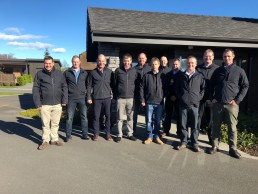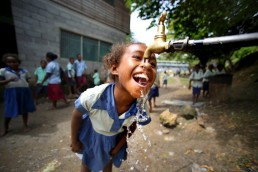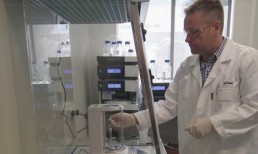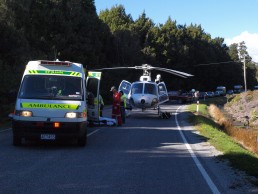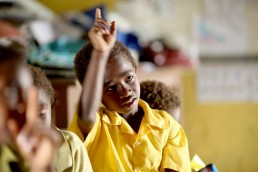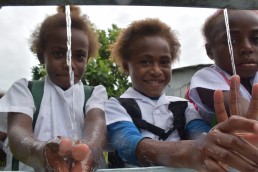Grochem goes from strength to strength – 25 years on
From humble beginnings back in the early 90s began a business supplying nutritional products for flowers. This year Grochem are celebrating 25 years in business, and for being a business that is growing from strength to strength by producing innovative and sustainable options for growers. We’re proud to say that today Grochem is the only completely Kiwi owned Agribusiness company, with “manufacturing capabilities”, research and development of new products for local and international growers being the core of what we do.
Even though success is not often celebrated here in Aotearoa, the food industry puts NZ on the map, and we here at Grochem are extremely honoured to have reached this milestone and for making our contribution to a thriving industry, with exports now around $3.6 billion annually.
WE’RE PROUD OF HOW FAR WE’VE COME
Success doesn’t just happen overnight, and as the only New Zealand owned and operated manufacturer, importer and developer of agrichemicals, investing a lot into research and development has certainly paid off.
Grochem has a lot to be proud of.
After AgriNova NZ Ltd took over the business assets of Grochem more than 12 years ago, the company has experienced rapid growth, and was delighted to be announced the 2017 Winner in the Deloitte’s Fast 50 Fastest Growing Agribusiness category for Wellington and the Lower North Island.
Some of our memorable achievements over the last 25 years have included:
- 2003: A world first registration for Ammonium Thiosulphate / Thin-it, for the primary thinning of apples
- 2006: Under the new HSNO act, Blossom Bless was the first biological to be registered
- 2010: World first label claim for fruit sizing of apples for Ambitious
- 2011: Introduced a 5-x concentrated 6Ba in our Bapsol100
- 2015: First in NZ to register Meteor, the revolutionary secondary thinning chemistry for apples
Grochem’s value in the market has certainly grown significantly since the starting days of 1993, and our products have been a major contributor to the industry’s success.
In New Zealand:
- Apples: In 1993, there were $380 million of exports coming from 13,000 hectares of land. Twenty-five years later, that figure has increased to $692 million, coming from only 8,800 hectares.
- Kiwifruit: While the amount of space for growing kiwifruit is the same today as it was in 1993, the fruit did go through the PSA era where the number of hectares did drop. Only through the efforts of plant pathology scientists was kiwifruit able to thrive again, with exports have increasing from $350 million to $1.6 billion.
- Avocados: There is no export value for avocados back in 1993, but this year the figure is set to be $91 million.
OUR PEOPLE
The core of any successful business is its people, and at Grochem, it’s no different.
Our team is our backbone, and the calm but strong hands of every department including R&D, Product Compliance, Sales, Service, Manufacturing, Freight Logistics and Regulatory are what makes us who we are.
Our Operations Manager has been with us for over 19 years, which truly demonstrates and shows a loyal and dedicated team. His team are responsible for making our products, and along with our batch testers, regulatory affairs, our warehouse team, our finance and our technical team, each person is responsible for bringing something to the table and they each show their passion and commitment to our company and its vision each and every day. Meet our team here.
Grochem also appreciates our expanding network of both national and multi-national partners, whom we work closely with to build a brighter future for the horticulture and wider growing industries.
COMMUNITY INITIATIVES
Grochem’s community initiatives enable us to give back to those communities that help us.
Our wonderful seasonal workers from Vanuatu leave their families and their homes to provide extra labour support for our growers, and in turn we work with the UNICEF WASH project through our Nordox campaign to donate money for clean water and sanitation to 150 schools in the Penama region. The NZ Government has also got behind this initiative, with last year’s total donation amounting to over $100,000. This year we look to be back on track to achieve a similar, if not larger, contribution. Learn more at the Vanuatu WASH project here.
As well as giving back to the people of Vanuatu, Grochem are running a campaign which is raising money for Hospice care in the apple growing communities of Hawkes Bay and Nelson. Through sales of Meteor, we’ll be donating $35 for every 1kg of Meteor sold. Learn more about this project here.
SO, WHAT DOES THE FUTURE HOLD?
Looking forward, we will continue to work with our amazing global team of suppliers, and in 2019, Grochem growers will continue to be leaders of their industry as we introduce new chemistry innovations and be committed to our product stewardship.
In an ever-changing industry, Grochem will continue to remain agile, with the ability to adopt and adapt as needed. On behalf of all of our team, we would like to thank everyone that we have connected with for their support and industry passion and look forward to another 25 exciting and innovative years.
Your choice could impact the lives of 10,000 Vanuatu school children
Last year, growers that purchased the disease control solution Nordox during two months of the year, supported work improving the quality of lives and wellbeing of over 10,000 school children across the Penama province of Vanuatu. Through their purchase, growers contributed $10 directly to the UNICEF water, sanitation and hygiene (WASH) project in schools.
The campaign to raise the funds, ran by the New Zealand owned and operated supplier of innovative solutions for growers, Grochem, wanted to support communities that make an impact here in our industry. Recognised Seasonal Employees (RSE) leave their families and homes for extended periods of time during harvest in New Zealand, and following the rapid growth of our kiwifruit and pipfruit sectors, it’s meant the demand for staff is increasing. The RSE, many of who come from Vanuatu, continue to fill this gap.
So, last year when searching for pathways to give back into Vanuatu communities, Grochem heard about the 5-year WASH in Schools project, ran by UNICEF, to be established in the Penama province. It was the perfect fit for them to partner and help communities who give so much to us.
In 2017, with the support of growers who purchased Nordox, along with an additional contribution from the New Zealand Government, an incredible $102,000 was raised towards the project.
With the tools and education needed to access clean water, sanitation and hygiene the project will reduce child sickness and increase the number of children attending schools. But more importantly, the knowledge and practices children develop through these projects carry on at home and into the community, creating a ripple effect of positive change, which improves with each generation that follows.
On 1 July 2017, the project was officially underway by UNICEF New Zealand, who’s extensive experience designing and implementing water and sanitation projects across communities means that the funds would have a real impact.
Through the months of July and September the UNICEF team established national and provincial government relationships, undertook baseline surveys, explored issues regarding appropriate facilities for girls and/or disabled children, and began school briefings – all was progressing well.
However, on 23 September 2017 the Manaro Volcano on Ambae Island, in the province of Penama, escalated to a level 4 eruption, and the mandatory evacuation of 11,600 adults and 5,220 children was underway.
After having to leave their homes, Ambae Island residents were living in evacuation centres across stadiums, parks, schools or community halls on three neighbouring islands. These centres had inadequate facilities for the large amount of people staying, and many had little to no access to water. The UNICEF team needed to direct their focus away from the water and sanitation project so they could focus on response activities related to the unfolding crisis, including ensuring families and students had access to essential water, sanitation, and hygiene kits.
When it was safe to return, tests were carried out to ensure there was no contamination from the volcanic ash. The residents of Ambae returned home in late October, where the WASH in Schools project resumed, alongside support to cope with the damage.
WASH-in-school kits were also distributed to each learning centre and school in Ambae to promote basic hygiene and help children get back to school.
While the project has been delayed, the work UNICEF carried out during both evacuation and recovery, links in to the long-term WASH in Schools programme, ensuring all children in Penama have access to basic functional and reliable water, sanitation and hygiene facilities.
To continue supporting the five-year project in Penama, Grochem are again running the campaign this year. The New Zealand Government have also committed to continuing supporting the efforts of the campaign, which will make a significant difference to the end result.
To support the project and to make a difference to the lives of over 10,000 Vanuatu school children, purchase Nordox at leading retailers between the month of May and June, where $10 will again be donated directly to the UNICEF water, sanitation and hygiene in schools project.
BioGro inputs case study
Originally posted on BioGro.co.nz here: https://www.biogro.co.nz/inputs-case-study/
Grochem have been manufacturing in Sunlight Grove, Porirua since 1993. Their initial development was based in liquid and powder foliar fertilisers and high-quality fertigation for cut flowers and horticulture in general. Now, they are the leading supplier of innovative, sustainable options for growers including plant nutrition, insecticides, fungicides and plant growth regulators.
Their business continues to grow rapidly driven by the needs of the Horticutural industry in New Zealand, Australia and South Africa. Working with innovative independent scientists and researchers to develop products that are effective while being more environmentally sustainable. In turn helping the industry meet the challenging demands of consumers and enabling crops to be grown more sustainably.
Grochem have been certified on the inputs for organic programme with BioGro for almost 17 years after listening to the strong demand of their customers looking to achieve organic market access overseas. Certification with BioGro stood out for Grochem, based on the International Market Access offering that their customers are looking for and the recognition of the brand across their array customers and New Zealand in general.
The process of certification was much more straightforward than first anticipated by Grochem. Great support and approachability was offered by the BioGro team to not only get the certification finalised – but ongoing support and communication when new products are developed and when challenges have arisen over the years.
“The ability to discuss requirements for certification of an input prior to application or even development assists us greatly with our decision-making process”
“Changes to market access requirements are always an issue for input products. Clarity, prior warning and the ability to define which export markets has been very useful”
For Grochem, organic certified customers and therefore products are a small percentage of their total agrichemical business. However, the move in mainstream agricultural to nil detectable residues, pressure for deregistration of products and increased pressure on traditional synthetic chemistry sees more frequency in considering organic alternatives.
As a business they also strive to hold themselves to high ethical standards in supporting RHANZ, Agrecovery and the UNICEF clean water program to their everyday goals of seeking better and safer products. “Certification has been an outward reflection of this to our customers.”
Grochem continue to be a rapidly growing and successful New Zealand business, one of the the last privately owned and operated manufactures of agrichemical in New Zealand. With their success they have received the Deloitte fast 50 fastness Agribusiness and supplier awards from their merchants – “BioGro certification is a component of this success.”
Strategic support focuses on wellbeing initiatives for rural New Zealand
Did you know that every 15 hours someone in New Zealand takes their own life?
It’s a sobering fact, and one that we can all agree needs drastic attention.
Research shows that those living in rural communities can be at a heightened risk of developing or suffering from depression. This is due to a number of factors including isolation, their place in the community, the feeling of having choices, and being able to access quality treatment and support when it’s needed.
When those things disappear, so too can the desire to keep living.
It’s not a small group we’re talking about either – New Zealand’s rural population consists of around 600,000 people, a population that together would be New Zealand’s second largest city behind Auckland.
However, the population doesn’t get the same level of access to mental health services as New Zealand’s big cities. In fact, of the $24 million spent on primary mental health services by the New Zealand Government, only $500,000 has been specifically allotted to rural mental health initiatives.
Our Managing Director George McHardy says rural New Zealanders need more support and wants growers and workers in the horticulture sector to be well represented.
“Although growers make up a small population in relation to the rest of New Zealand’s rural community, it’s important that growers are given similar support and representation as our larger livestock farming brothers.
“But, mental wellbeing isn’t usually one of the first things that come to mind when we think about advocacy for growers. However, with the current devastating rate of suicide in this country, it’s important that we shed some light on this and ensure growers are getting good information and support.”
That’s when George heard Michelle Thompson present at a rural sector conference and saw an opportunity to make an impact.
Michelle is the chief executive of the Rural Health Alliance Aotearoa New Zealand (RHĀNZ), an organisation that advocates for, and on behalf of, 49 member organisations to provide solutions and influence policy that affects the health and well-being of rural communities.
Her presentation was covering RHĀNZ’s five key initiatives of their Rural Health Road Map, and one particular aspect caught George’s attention – rural well-being.
“RHĀNZ is calling for the Government to implement its mental health and addictions framework for rural New Zealanders. It really resonated with me and I knew it was important for Grochem to get behind it.
George also said it is important for businesses like Grochem to give back to our communities, especially those that directly impact the success of our business. By supporting them, they support us.
Michelle from RHĀNZ said we really walked the talk by exploring how we could be involved and is thrilled to have us on as the latest Strategic Supporter of RHĀNZ.
“We were most excited about having Grochem coming onboard as there is a lot of opportunities for us to impact the horticulture sector in a really positive way. Having a supplier in the industry join us is how we can make a difference in more of New Zealand’s rural pockets.”
Our funding support will be used over the next 12 months to progress the priorities of the RHĀNZ Rural Health Road Map, with a special focus on their rural mental health initiatives.
The Rural Health Road Map is RHĀNZ’s plan for supporting and growing healthy rural communities in New Zealand. The roadmap focuses on achieving five goals.
RHĀNZ’s Five Rural Health Road Map Goals
Rural wellbeing
The objective is to ensure rural people are connected to their communities and know how to take care of themselves and each other.
The key initiative here is to have resourcing for the implementation of the RHĀNZ-led framework which will improve mental health outcomes for rural New Zealanders.
RHĀNZ is also calling for the Ministry of Primary Industries and the Ministry of Health to continue their funding boost to support rural mental health initiatives, and to also undertake research on rural youth at risk.
Rural health services
The goal is for rural communities to have excellent access to health care services closer to home and timely access to specialist and emergency services when required.
Rural health workforce
RHĀNZ want rural health and social service professionals to be well resourced and supported to provide the highest quality of service for people in their care.
Rural research and policy
This is about having a strong evidence base from which to work so that we can help inform community development, resource allocation; health service provision; targeted interventions and outcomes measures. These are all critical for understanding whether rural health outcomes are poorer than urban outcomes and if there is a gap then where best to channel our scarce resources.
Rural connectivity
The goal is for rural communities to have excellent access to reliable, high quality & affordable broadband and mobile connectivity. Achieving this goal is a key enabler of the other four goals as it underpins rural liveability.
Show your support
Rural New Zealand is vital to the whole country. In order to keep New Zealand healthy, we need our rural community to be healthy. You can show your support and help RHĀNZ to advocate so that rural New Zealand, and our growers, are not overlooked at the national level during strategic planning for health service options and social services provision.
To learn more about what RHĀNZ visit www.rhaanz.org.nz
More information
Early warning signs that you, or someone you know, is in trouble:
– Poor sleep – too much or too little
– Moodiness or aggression – short-tempered when usually not
– Increased smoking and increased use of alcohol and drugs
– Poor appetite – lost interest in food
– Withdrawing from friends, becoming socially isolated
– Neglect and poor treatment of animals
What to do?
– Talk to someone you know
– Connect socially
– Call or text “1737” to talk to a mental health professional
– Call your local Rural Support Trust
– Find the nearest ‘Good Yarn’ – farmer wellness workshops
– Visit www.depression.org.nz for a wealth of information
– If it’s an emergency and you feel like you or someone is at risk, Call 111 and ask for Police.
Grochem & Unicef raise $92,000
The rapid growth in the kiwifruit and pipfruit sectors has meant growers have had to seek more staff for harvest, many of the workers are ‘Recognised Seasonal Employees’ (RSE) who travel from overseas to work in New Zealand during these demanding times. With a large proportion of these RSE working coming from Vanuatu, the nation that was devastated by Cyclone Pam only two years ago, Grochem recognised an opportunity to make a difference to the RSE workers and their families.
With the support of UNICEF, Grochem has raised a total of $92,000 towards a clean water and sanitation project for 10,000 school-aged children in Vanuatu. Inspired by the fungicide producer who makes Nordox, Grochem raised $18,400 of the final total through sales of the product here in New Zealand. Along with Grochem and UNICEF’s efforts, the New Zealand Government contributed additional funds to the campaign.
Grochem General Manager Grant Morrish said the workers that leave their families and homes for such a long period of time, provide a great benefit to our growers in New Zealand, and Grochem are invested in giving back.
“We began our search to find different ways to provide support to Vanuatu and it wasn’t long before we found UNICEF. UNICEF was promoting a large-scale 5-year project for Vanuatu to provide clean water and sanitation to 157 schools in the Penema region. After discussing with UNICEF, we began shaping the Nordox campaign to support this project.”
Mr Morrish said UNICEF had indicated that the New Zealand Government were looking to also support the project.
“Once UNICEF heard about the money we had raised, they were able to confirm that the New Zealand Government would contribute another $4 to every $1 we had made for the project. We really want to thank Grochem, Nordox, staff and especially the growers who purchased Nordox, for supporting this campaign and making it the success that it has been. What a wonderful outcome for all involved.”
Nordox (Cupruous Oxide) is a disease control solution for various horticulture crops and a lead selling product for Grochem. It’s made using the highest quality copper under strict environmental conditions. The supplier of Nordox, does similar charitable work in Africa.
Grochem is a leading supplier of innovative, sustainable products for growers including plant nutrition, insecticides, fungicides and plant growth regulators. They work with innovative, independent scientists and researchers to develop products that are effective while being environmentally sustainable.
To continue to support the great work Grochem is doing, you can purchase Nordox at leading retailers.
Help families in Vanuatu with Nordox 75WG
Water can make a world of difference in Vanuatu
Without clean water, toilets or hand-washing facilities, going to school can mean getting sick for kids in Vanuatu.
What’s the situation in Vanuatu?
Although Vanuatu may seem like a tropical island paradise, a raft of natural disasters in recent years has wrecked havoc on infrastructure, crops, homes and schools, and families are struggling to cope.
Children in the remote Penama province are some of the most vulnerable in the entire country and they urgently need your help. With the majority of schools in the province not having toilets, a safe water supply or facilities for washing hands, children are falling sick. Diarrhoea, cholera and other water-borne diseases are common here, and these nasty germs often spread like wildfire.
Parents shouldn’t have to make the decision to risk their child’s health in order to give them a life-changing education.
Every pupil. Every school
With your help, we can transform the life of every child in Penama province.
Your gift will help give children safe water to drink at school, provide crucial hand-washing facilities, build toilets for both girls and boys, and improve the overall education of 10,000 disadvantaged children.
This is long term project on a really large scale which will reach 157 pre-schools, primary and secondary schools in the area.
There is no greater life-changing difference you can make for these young lives.
